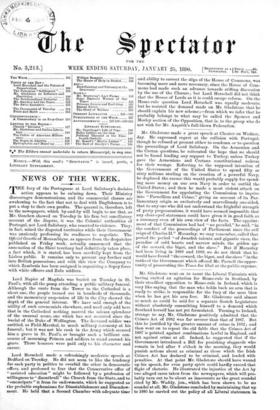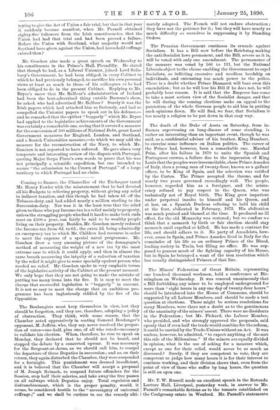Mr. Gladstone went on to taunt the Liberal Unionists with
having excited an agitation for Home-rule in Scotland, by their steadfast opposition to Home-rule in Ireland, which is very like saying that the man who holds back an arm that is ready to strike, is responsible for the fury of the next blow when he has got his arm free. Mr. Gladstone said almost as much as could be said for a separate Scotch Legislature without absolutely committing himself to a demand which Scotland herself has not yet formulated. Turning to Ireland, strange to say, Mr. Gladstone positively admitted that the Crimes Act of 1882 was far severer than that of 1887. But this he justified by the greater amount of crime in 1882; and then went on to repeat the old fable that the Crimes Act of 1887 is pointed against combinations lawful in England, and not against crime at all. Indeed, he suggested that if the Government introduced a Bill for punishing sluggards who remain in bed after 9 o'clock in the morning, they would punish actions about as criminal as those which the Irish Crimes Act has declared to be criminal, and loaded with penalties. At that point Mr. Gladstone should have wound up his speech, for even party spirit could hardly exeeed that flight of rhetoric. He illustrated the injustice of the Act by two alleged cases taken from the newspapers, which will pro- bably turn out to be about as inaccurate as the great scandal cited by Mr. Waddy, jun., which has been shown to be no scandal at all. Mr. Gladstone concluded by maintaining that up to 1885 he carried out the policy of all Liberal statesmen in
trying to give the Act of Union a fair trial, but that in that year it suddenly became manifest, when Mr. Parnell obtained eighty-five followers from the Irish constituencies, that the Union had had that trial and had been proved a failure. Before the Union with Scotland, what majority would not Scotland have given against the Union, had household suffrage existed then?



















































 Previous page
Previous page